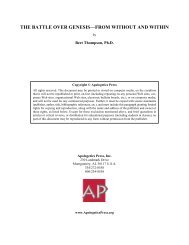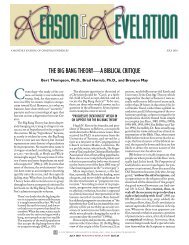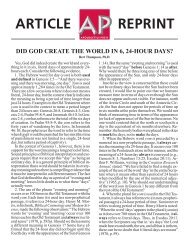The Many Faces, and Causes, of Unbelief - Apologetics Press
The Many Faces, and Causes, of Unbelief - Apologetics Press
The Many Faces, and Causes, of Unbelief - Apologetics Press
You also want an ePaper? Increase the reach of your titles
YUMPU automatically turns print PDFs into web optimized ePapers that Google loves.
UNJUST ACTS COMMITTED BY<br />
BELIEVERS IN THE NAME OF GOD<br />
It has been said that perhaps the only thing that is consistent<br />
in this world is inconsistency. Anyone who has tried to<br />
live according to a st<strong>and</strong>ard can attest to the fact that such a<br />
statement contains an element <strong>of</strong> truth. <strong>The</strong> refrain, “Ah, consistency,<br />
thou art a rare jewel,” reverberates within the human<br />
soul on a daily basis. Likely, most people want to live a<br />
consistent (<strong>and</strong>, hopefully, a consistently good) life. But such<br />
a feat <strong>of</strong>ten falls under the category <strong>of</strong> “easier said than done.”<br />
Especially is this true when the st<strong>and</strong>ard by which a person is<br />
attempting to live is itself a consistently high one.<br />
Enter belief in God <strong>and</strong> His Word. Even when those <strong>of</strong> us<br />
who firmly believe in God, <strong>and</strong> who confidently accept the<br />
Bible as His inspired communication to mankind, strive diligently<br />
to conform our words <strong>and</strong> deeds to those set out in<br />
God’s Word, we sometimes still fail. David, Israel’s beloved<br />
king, was described as a man after God’s “own heart” (1 Samuel<br />
13:14), yet he committed adultery with Bathsheba <strong>and</strong><br />
had her husb<strong>and</strong>, Uriah, murdered (2 Samuel 11-12). Peter,<br />
one <strong>of</strong> the Lord’s h<strong>and</strong>-chosen apostles, loved his Master<br />
dearly, yet denied Him publicly three times on the eve <strong>of</strong> His<br />
crucifixion (Matthew 26:34,69-75). Even the apostle Paul<br />
waged his own personal war against the frequent temptations<br />
to do evil rather than good. When he wrote to encourage the<br />
first-century Christians in Rome, he admitted:<br />
For the good which I would I do not: but the evil which<br />
I would not, that I practice. For I delight in the law <strong>of</strong><br />
God after the inward man: but I see a different law in<br />
my members, warring against the law <strong>of</strong> my mind,<br />
<strong>and</strong> bringing me into captivity under the law <strong>of</strong> sin<br />
which is in my members (Romans 7:19,22-23).<br />
Adding to the problem is the fact that we may be absolutely<br />
sincere in what we do or say, yet still be entirely wrong. For<br />
example, consider the case <strong>of</strong> Uzzah. God had instructed the<br />
Israelites in a most specific manner (Numbers 4:15,19-20) that<br />
- 108

















